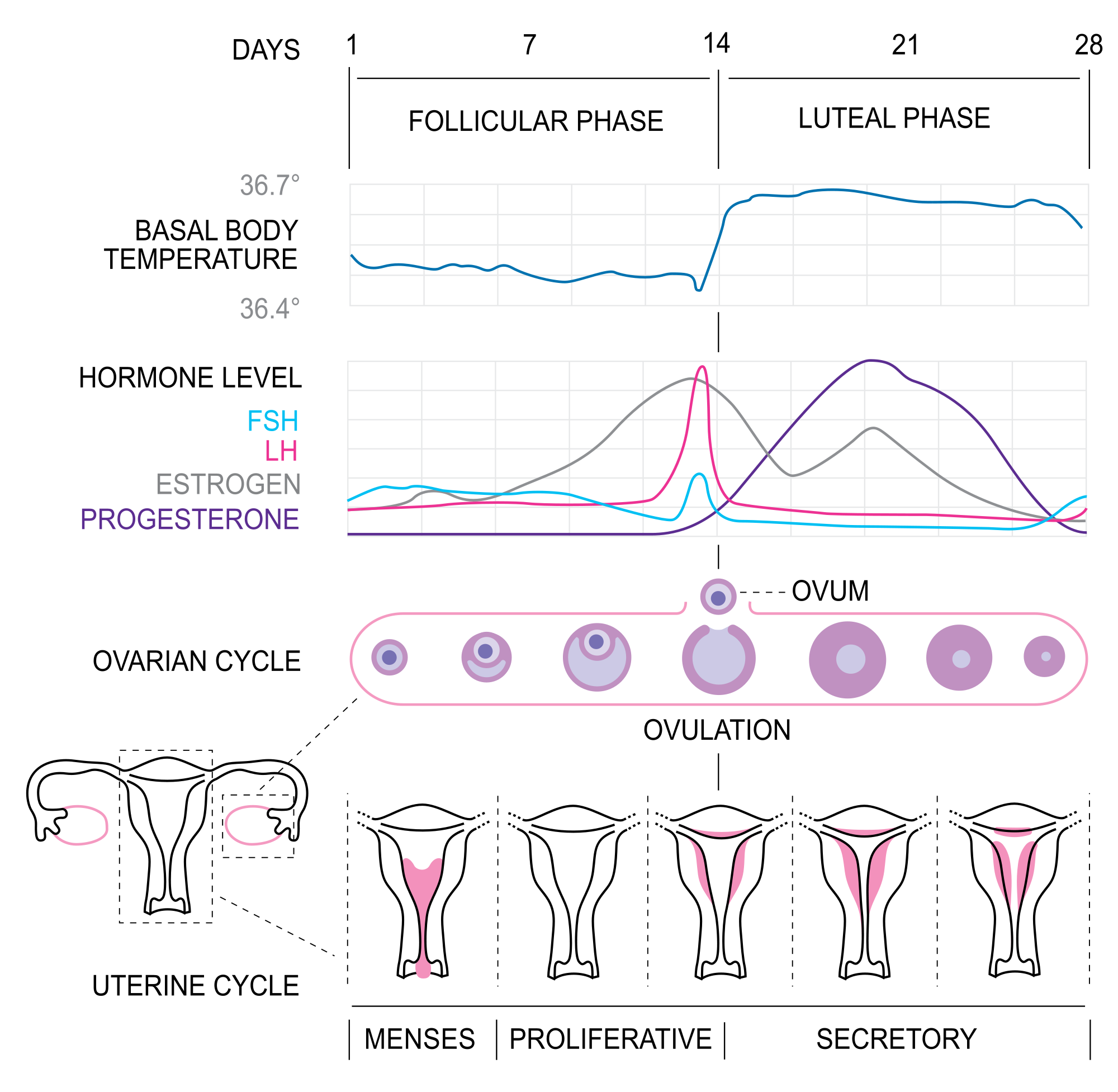Why Does My Weight Fluctuate pt. 1 - Menstrual Cycle
Weight Loss Can Be Confusing
Do you ever feel like you’re doing all of the right things to lose weight, but the numbers on the scale or the fit of your clothes tell you otherwise? Maybe you’ve been sticking to your usual nutrition plan, but still feel weirdly bloated and you’re 2lbs heavier… It happens to the best of us.
There are about 107 reasons why your weight and body composition fluctuates (okay maybe not that many, but there are quite a few). As coaches, there are some key questions we can ask to get to the bottom of weight fluctuations.
First question—are you on your period?
If you’re a woman, you probably already know how your menstrual cycle affects you. Every woman has a different experience, but I don’t think any of us would say that it’s fun. You might be thinking, “Duh, I feel super bloated and angry at certain points during the month and I want to eat every cookie in sight. What else do I need to know?” You may be interested to know the reasons why your cycle affects you and what you can do about it.
If you’re a man, first, congrats for sticking with me and reading this far, but also, you may think this post has nothing to do with you. I’d say it does. Chances are, you know at least one woman (safe to say, you probably know multiple). Maybe she’s your wife, your coworker, or your client. Knowing what she goes through on a monthly basis is:
Kind of fascinating and…
Worth knowing so that you can be a more understanding husband, coworker, coach, or human.
source: https://upload.wikimedia.org/wikipedia/commons/thumb/2/2a/MenstrualCycle2_en.svg/2000px-MenstrualCycle2_en.svg.png
In Case You Need a Refresher…
To start, there are a handful of terms we should get familiar with (1):
Cycle – the process a woman’s body goes through every month to prepare for a potential pregnancy, that refers to all phases, and typically lasts 28 days.
Period – aka menstruation, is the first few days of the cycle.
Follicular phase – this is the first half of the cycle, or the days between the first day of the cycle and ovulation.
Ovulation – midpoint of the cycle, when a mature egg is released from the ovary.
Luteal phase – second half of the cycle, or the days between ovulation and first day of the cycle.
Keep in mind that the days listed in the diagram are generalizations, as some women have longer or shorter cycles and experience ovulation on a different day (2). Taking fertility drugs, hormones, or birth control pills can significantly affect hormone levels and cycle length.
Weight Gain During a Period - How Much is Normal?
I’m afraid there’s not a simple answer to that question (sorry guys and gals). What we can say is that significant weight gain is unlikely during the period itself. Yep, you read that correctly. We need to look at the big picture of what happens throughout the entire month to understand weight fluctuations.
Long story short, a fluctuation of about +/- 5lbs can be attributed to a woman’s monthly cycle at several points during the month.
Water Retention
Increased levels of the hormones estrogen and progesterone typically lead to water retention, and levels fluctuate throughout the cycle.
Estrogen levels increase before ovulation (midpoint of the cycle), then drop down during the beginning of the luteal phase (after ovulation, before the next period).
As estrogen levels decrease during the luteal phase, progesterone levels increase, leading to another increase in water retention. By the time the period starts, estrogen and progesterone levels drop back down and water retention decreases with each day.
Theoretically, estrogen and progesterone can lead to water retention, but practically, women may feel a bit differently. Some research suggests that women can perceive water retention to be the greatest during the first day of their cycle (3).
Water retention can be one reason for weight fluctuations, but it’s definitely not the only reason. And, now we know that weight gain due to water retention is unlikely during the actual period itself. So… what else is going on?
Beyond Water Weight
Progesterone has a couple of other noteworthy effects that may affect bodyweight. This hormone can affect how the smooth muscles of the GI tract function and lead to constipation, which increases feelings of fullness (4).
On top of making you feel constipated, progesterone can increase appetite and cravings for foods like sweets, salty foods, protein-rich foods, and yes…chocolate. I wanted to do my best to avoid clichés in this post, but the research doesn’t lie (5). If you’re a woman who experiences cravings during this time, try not to beat yourself up. Keep in mind that cravings can be a key part of natural, biological drives. Progesterone is highest during the luteal phase, or the time after ovulation, where an egg could potentially be fertilized and implant itself in the uterine lining to grow. (Your body is telling you it needs more fuel!)
A note about PMS (aka premenstrual syndrome) – This usually happens 1-2 weeks before the period starts (aka the luteal phase) and refers to a host of symptoms like mood disturbances, increased cravings, bloating, and weight gain.
Changes in mood and energy can affect food choices and activity level. While one skipped workout or a bowl of mac and cheese won’t make you gain a pound, patterns that lead to a consistent calorie surplus might. (Remember, since 1lbs of body fat contains roughly 3500 calories, it takes a significant weekly excess to cause weight gain.)
What can you do?
Track weight trends and symptoms throughout the month.
Stay active - Although it seems counterintuitive, exercise can actually help ease symptoms of PMS like fluid retention and mood disturbances (6).
Plan indulgences. A piece of chocolate or whatever you’re craving can fit into your plan. Save up for foods that you truly will enjoy, then take your time to eat them mindfully.
Decrease bloat by eating less salty foods and more fiber.
Take-home points:
The levels of hormones estrogen and progesterone fluctuate throughout the cycle and can lead to water retention. Water retention is highest around the midpoint of the monthly cycle and the 1-2 weeks before a period.
Some weight fluctuation may be due to changes in food choices and activity level, not water weight alone. PMS can lead to increased food cravings and physical symptoms that decrease physical activity level.
Ladies, don’t stress! It is normal to have small fluctuations in weight throughout the month. If you’re concerned that your weight is fluctuating due to your monthly cycle, track your weight trends and symptoms, stay active, plan (and mindfully enjoy!) indulgences, and minimize bloat by eating more fiber and less salt.
This blog was created by Xplore Nutrition coach & registered dietitian, Chelsea Jackle.
References:

